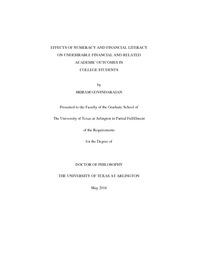
ATTENTION: The works hosted here are being migrated to a new repository that will consolidate resources, improve discoverability, and better show UTA's research impact on the global community. We will update authors as the migration progresses. Please see MavMatrix for more information.
Show simple item record
| dc.contributor.advisor | Levine, Daniel S. | |
| dc.creator | Govindarajan, Sriram | |
| dc.date.accessioned | 2016-07-22T17:50:03Z | |
| dc.date.available | 2016-07-22T17:50:03Z | |
| dc.date.created | 2016-05 | |
| dc.date.issued | 2016-05-31 | |
| dc.date.submitted | May 2016 | |
| dc.identifier.uri | http://hdl.handle.net/10106/25832 | |
| dc.description.abstract | Numeracy was a better predictor of financial delinquency than financial literacy. The relationship between numeracy and undesirable academic effects was fully mediated by financial delinquency. It was also found that in a credit card related decision making task, the relationship between numeracy and performance was partially mediated by the deliberation time. This is similar to the finding in Ghazal et al. (2014) and supporting their conclusion that numeracy is just not facility with numbers, but also related directly to heuristic deliberation and metacognition. The findings also support the notion that people low in numeracy might be prone to various biases and fallacies that might lead to deleterious financial behavior and attitudes. | |
| dc.format.mimetype | application/pdf | |
| dc.language.iso | en_US | |
| dc.subject | Numeracy | |
| dc.subject | Financial literacy | |
| dc.title | EFFECTS OF NUMERACY AND FINANCIAL LITERACY ON UNDESIRABLE FINANCIAL AND RELATED ACADEMIC OUTCOMES IN COLLEGE STUDENTS | |
| dc.type | Thesis | |
| dc.degree.department | Psychology | |
| dc.degree.name | Doctor of Philosophy in Psychology | |
| dc.date.updated | 2016-07-22T17:51:07Z | |
| thesis.degree.department | Psychology | |
| thesis.degree.grantor | The University of Texas at Arlington | |
| thesis.degree.level | Doctoral | |
| thesis.degree.name | Doctor of Philosophy in Psychology | |
| dc.type.material | text | |
Files in this item
- Name:
- GOVINDARAJAN-DISSERTATION-2016.pdf
- Size:
- 735.5Kb
- Format:
- PDF
This item appears in the following Collection(s)
Show simple item record


